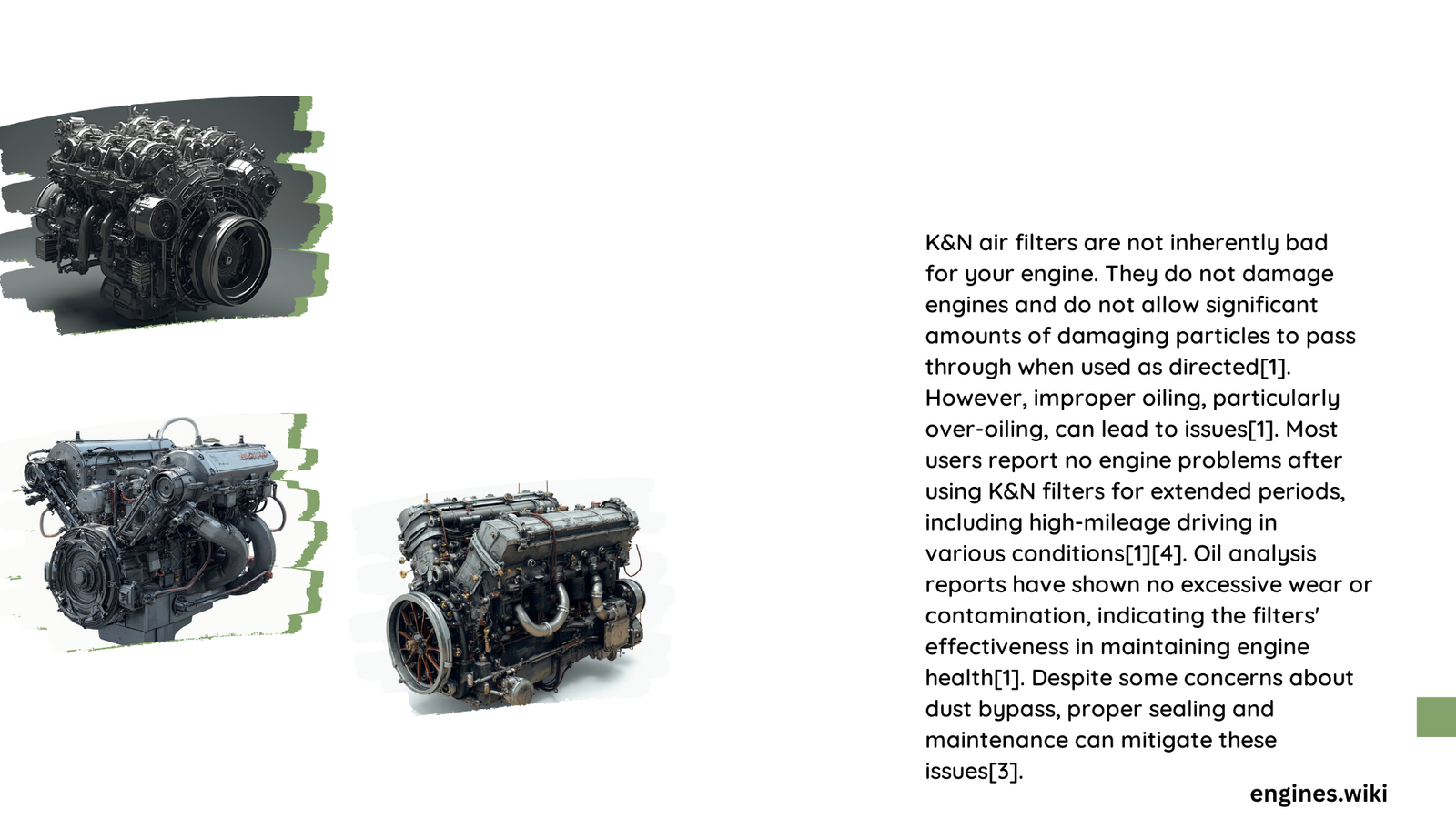K&N air filters are popular aftermarket components designed to increase airflow and potentially improve engine performance. However, concerns about their impact on engine health have led to debates among automotive enthusiasts. This article examines the effects of K&N air filters on engine performance, longevity, and reliability, addressing common questions and misconceptions to help you make an informed decision about using these filters in your vehicle.
What Are the Key Differences Between K&N and Stock Air Filters?
K&N air filters differ from stock filters in several important ways:
- Design: K&N filters use a cotton gauze material treated with oil, while stock filters typically use paper or foam.
- Airflow: K&N filters generally allow more air to pass through compared to stock filters.
- Lifespan: K&N filters are designed to be cleaned and reused, while stock filters are usually disposable.
- Filtration: K&N filters may allow slightly more particles to pass through in exchange for increased airflow.
Here’s a comparison table:
| Feature | K&N Air Filter | Stock Air Filter |
|---|---|---|
| Material | Cotton gauze with oil | Paper or foam |
| Airflow | Higher | Lower |
| Lifespan | Reusable (up to 175,000 miles) | Disposable (15,000-30,000 miles) |
| Maintenance | Requires cleaning and re-oiling | Replace periodically |
| Cost | Higher initial cost | Lower initial cost |
How Do K&N Air Filters Affect Engine Performance?

K&N air filters can potentially improve engine performance in several ways:
- Increased Airflow: K&N filters typically allow more air into the engine, which can lead to improved combustion efficiency.
- Horsepower Gains: Some users report modest horsepower gains, especially in modified engines that can take advantage of the increased airflow.
- Throttle Response: The higher airflow may result in improved throttle response in some vehicles.
However, it’s important to note that performance gains can vary significantly depending on the specific vehicle and engine configuration.
Are There Any Risks to Using K&N Air Filters?
While K&N air filters offer potential benefits, there are some concerns to consider:
- Increased Particulate Ingestion: The higher airflow may allow more dust and debris to enter the engine, potentially leading to increased wear over time.
- Oil Contamination: Overuse of oil during filter maintenance can lead to contamination of the Mass Air Flow (MAF) sensor in some vehicles.
- Warranty Concerns: Some vehicle manufacturers may void parts of the warranty if aftermarket air filters are used.
How Do K&N Air Filters Impact Engine Longevity?
The impact of K&N air filters on engine longevity is a subject of debate:
- Filtration Efficiency: K&N filters typically achieve 97-99% filtration efficiency, which is comparable to or exceeds OEM standards.
- Long-term Studies: There is a lack of comprehensive long-term studies comparing engine wear between K&N and stock air filters.
- Anecdotal Evidence: Some users report no issues after years of use, while others claim increased engine wear.
It’s important to note that proper maintenance of K&N filters, including regular cleaning and re-oiling, is crucial for optimal performance and engine protection.
What Are the Maintenance Requirements for K&N Air Filters?
Proper maintenance is essential for K&N air filters:
- Cleaning Frequency: Clean the filter every 50,000 miles under normal driving conditions, or more frequently in dusty environments.
- Cleaning Process: Use K&N’s recharger kit, which includes a cleaner and oil.
- Re-oiling: Apply the correct amount of oil after cleaning to maintain filtration efficiency.
- Inspection: Regularly inspect the filter for damage or excessive dirt buildup.
Are K&N Air Filters Cost-Effective in the Long Run?
The cost-effectiveness of K&N air filters depends on several factors:
- Initial Cost: K&N filters are more expensive upfront compared to stock filters.
- Longevity: K&N filters can last up to 175,000 miles with proper maintenance, potentially offsetting the higher initial cost.
- Maintenance Costs: Factor in the cost of cleaning supplies and the time required for maintenance.
- Potential Performance Benefits: Any fuel efficiency or performance gains should be considered in the overall value proposition.
What Do Expert Mechanics Say About K&N Air Filters?
Opinions among expert mechanics vary:
- Some praise K&N filters for their high airflow and potential performance benefits.
- Others express concerns about long-term engine protection, especially in dusty environments.
- Many recommend sticking with OEM filters for those prioritizing engine longevity over performance gains.
How Do K&N Air Filters Perform in Different Driving Conditions?
K&N air filters may perform differently depending on the driving environment:
- Normal Road Conditions: Generally perform well with no significant issues.
- Dusty or Off-Road Environments: May require more frequent cleaning and could potentially allow more particulates into the engine.
- High-Performance Driving: Can support increased airflow demands of modified engines.
What Are the Alternatives to K&N Air Filters?
If you’re considering alternatives to K&N air filters, here are some options:
- OEM Filters: Provide reliable performance and are designed specifically for your vehicle.
- Other Aftermarket Brands: AEM, Airaid, and Injen offer similar reusable air filter options.
- High-Flow Paper Filters: Provide a balance between increased airflow and filtration efficiency.
Conclusion: Are K&N Air Filters Bad for Your Engine?
Based on the available information, K&N air filters are not inherently bad for your engine when properly maintained. They offer potential performance benefits and long-term cost savings. However, they may not be the best choice for every vehicle or driving condition. Consider your priorities, driving environment, and willingness to perform regular maintenance when deciding whether to use a K&N air filter in your engine.
References:
1. Harley Davidson Forums – K&N Airflow Vs Stock Air Cleaner?
2. LS1Tech.com – K&N vs. stock air filter – HP vs. CFM flow question
3. K&N – Frequently Asked Questions
